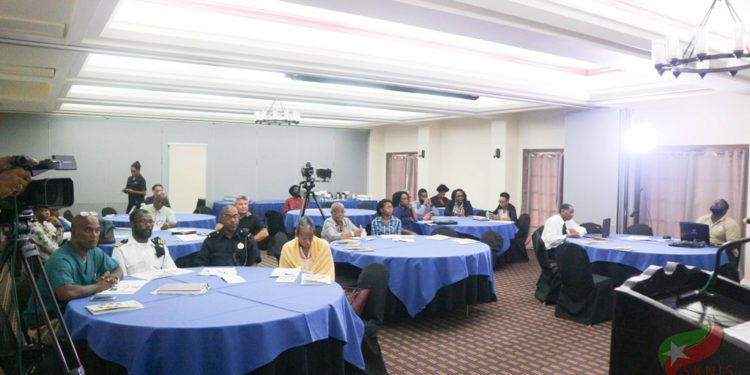Basseterre, St. Kitts, September 05, 2018 (SKNIS): A number of stakeholders representing a wide range of sectors in St. Kitts were made more aware of the principles underpinning the Nagoya Protocol and the importance of St. Kitts and Nevis becoming a party to the Protocol, thanks to an Access and Benefit Sharing (ABS) workshop, which convened on Wednesday, September 05, at the Ocean Terrace Inn (OTI).
Alistair Edwards, Permanent Secretary, who has responsibility for Environment, welcomed the participants and noted that St. Kitts and Nevis views the Nagoya Protocol as extremely important.
“St. Kitts and Nevis recognizes the Nagoya Protocol on Access to Benefit-Sharing as an opportunity to promote and conserve the mutually beneficial exploration of our biological resources,” said the permanent secretary. “The Government of St. Kitts and Nevis recognizes the importance of this Protocol and is cognizant of the fact that its implementation will create greater legal certainty and transparency for both providers and users of genetic resources.”
The permanent secretary said that it is important for each and every one to contribute in some way to the development of legislative provisions to implement the Nagoya Protocol that is anticipated to be enacted by Parliament in due course.
“One of the core requirements of the Nagoya Protocol calls for countries to develop domestic ABS legislation in order to effectively implement the Nagoya Protocol. Our deliberations would therefore be in accordance with this fundamental requirement that would enable St. Kitts and Nevis to fulfil its obligations under the Protocol upon ratification,” he said.
Environmental Scientist in the Department of Environment and National Focal Point for the project, Eavin Parry, said that St. Kitts and Nevis has been a participating member state in the Global Environment Fund (GEF) Advancing the Nagoya Protocol in countries of the Caribbean” for the past two years and has reaped many benefits.
“We have benefited significantly as a country in our quest to lay the ground work and operationalize the Nagoya Protocol at the national level,” he said, while expounding on participants expectations for the workshop. “They would be expected to have an understanding of ABS concepts and how they relate to our national circumstances; understand the rules of the various institutions represented here as it relates to having a functional ABS system in St. Kitts and Nevis; and play an active role in contributing to the discussions relating to developing ABS policy and legal measures in St. Kitts and Nevis.”
The September 5-7 workshop is hosted by the Department of Environment and facilitated by the International Union for the Conservation of Nature (IUCN), with funding from the United Nations Environment (UNE) and the Global Environment Fund (GEF).









